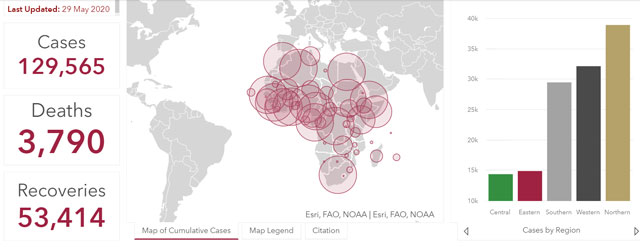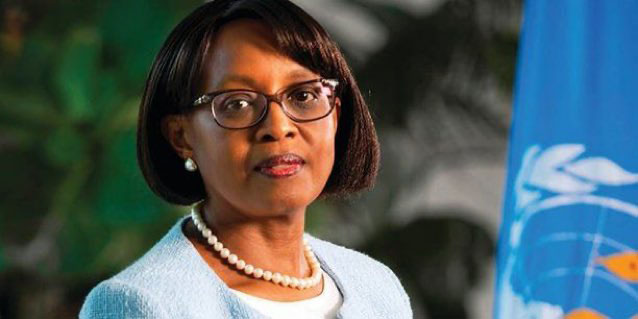‘Africa is in mid-morning of COVID-19 crisis’
by RONALD MUSOKE

Kampala, Uganda | RONALD MUSOKE | African governments will have to go slow on lifting some of the lockdown measures they instituted to control the spread of the COVID-19 pandemic, senior officials at the World Health Organization (WHO) and the Africa Centres for Disease Control and prevention have said.
Speaking at a virtual press briefing jointly organized by the Geneva-based World Economic Forum and WHO on May 28, Dr. Dr. Matshidiso Moeti, the WHO regional director for Africa noted that although most African countries have reported fewer than 1,000 cases so far, cases of COVID-19 had tripled in five African countries and doubled in 10 countries over the last two weeks.
“This means that as governments ease lockdowns and other social measures, it’s important that strong public health measures are in place all over the territories not just in the capital cities; that communities are empowered and enabled to take preventive actions, and that we continue working on strengthening health systems and delivering essential services to people,” she said as the ministers of health for Mauritius, South Africa and Uganda listened in.

Speaking separately a day earlier to a group of African journalists on the Thomson Reuters Foundation COVID-19 Crisis Reporting Hub programme, Dr Ahmed Ogwell, the deputy director of the Africa Centres for Disease Control and prevention also noted that in comparison to what other parts of the world are seeing, Africa, ‘is in the mid-morning’ of the COVID-19 crisis.
Dr. Ogwell said 54 of the 55 African countries have reported COVID-19, adding that the cases are doubling every 7-8 days on the continent.
“If you look at Africa, the top five countries right now that in total account for just under 60% of all the cases in Africa, are South Africa at 21%, Egypt at about 16%, then Algeria, Nigeria and Morocco, each one at about 7%.”
COVID-19 genesis
On March 27, Sub-Saharan Africa registered its first COVID-19 case in Nigeria. From then, it took 36 days for the region to register 1000 cases, and then 62 days to move to 100,000 cases. As of May 29, Africa had registered 129,790 cases of COVID-19; 3790 people had died from the pandemic while 53,414 patients had recovered according to the Africa Centres for Disease Control and Prevention.
Many countries implemented lockdowns and key public health measures early. Thirteen countries in sub-Saharan Africa including Uganda implemented lockdowns along with other public health and social measures nation-wide, while ten more implemented partial lockdowns in hotspots. These interventions appear to have helped slow down the spread of the disease.
“Three months since the first case of COVID-19 was reported in sub-Saharan Africa, it appears that the swift actions taken by African leaders and communities has slowed the spread of the virus,” said Dr. Moeti.
“These actions came at great social and economic cost, particularly for the most vulnerable and there is an understandable push to lift the measures as rapidly as they were implemented. However, WHO urges countries to follow a step by step approach.”
There are concerns that if these measures are relaxed too quickly, COVID-19 cases could start increasing rapidly. Preliminary analysis by WHO has found that the doubling time – the number of days for case numbers to double in a given country – increased during the lockdown period in most of the countries of the region. For example, in Ivory Coast it took 5-41 while in South Africa, it took 3-14 according to WHO.
Share on: WhatsApp Pages: 1 2